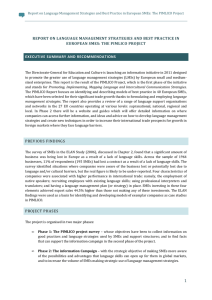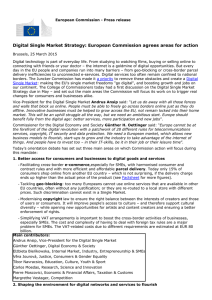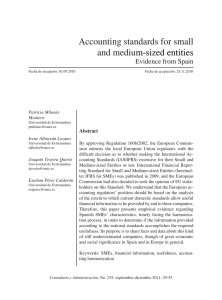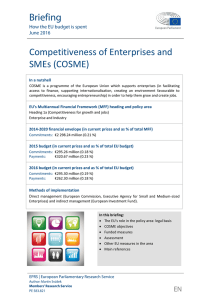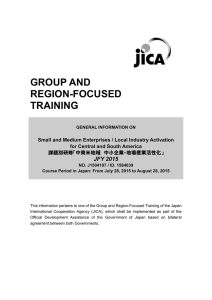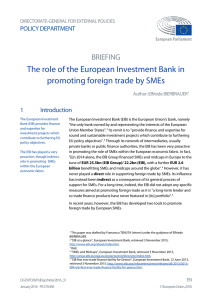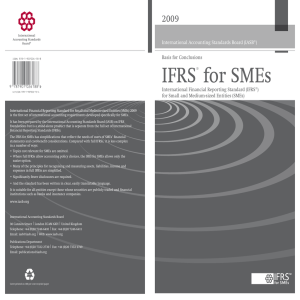Promoting Small and Medium Enterprises for
Anuncio
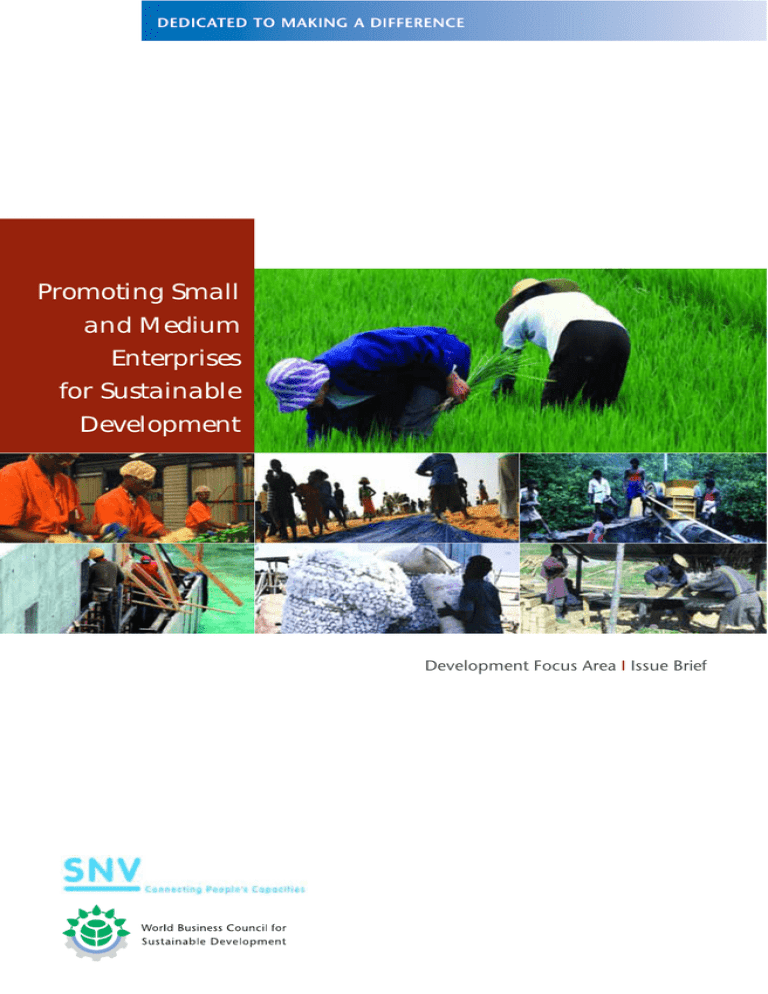
Promoting Small and Medium Enterprises for Sustainable Development Development Focus Area I Issue Brief About the WBCSD About SNV The World Business Council for Sustainable Development (WBCSD) brings together some 200 international companies in a shared commitment to sustainable development through economic growth, ecological balance and social progress. Our members are drawn from more than 30 countries and 20 major industrial sectors. We also benefit from a global network of about 60 national and regional business councils and partner organizations. SNV is a leading, Netherlands-based, international development organisation with more than 900 technical advisors located in 90 offices in more than 30 developing countries, that provides strategic advisory, knowledge and advocacy support services to more than 1800 public, private and social sector organisations in Africa, Asia, the Balkans and Latin America to accelerate and sustain their fight against poverty. Our mission is to provide business leadership as a catalyst for change toward sustainable development, and to support the business license to operate, innovate and grow in a world increasingly shaped by sustainable development issues. Our mission: SNV is dedicated to a society where all people enjoy the freedom to pursue their own sustainable development. Our advisors contribute to this by strengthening the capacity of local organisations. Our objectives include: Our impact focus: SNV is committed to catalysing impact through the promotion and improvement of income generation, employment and production (through competitive, value-added market chains) for low income communities and increasing the access and sustainability of basic services with a particular concentration in health, education, water and sanitation and renewable energy for these underserved communities. Business Leadership – to be a leading business advocate on sustainable development; Policy Development – to help develop policies that create framework conditions for the business contribution to sustainable development; The Business Case – to develop and promote the business case for sustainable development; Best Practice – to demonstrate the business contribution to sustainable development and share best practices among members; Global Outreach – to contribute to a sustainable future for developing nations and nations in transition. Our beliefs: Poverty results from unequal access to resources and power, between different social and cultural groups and between men and women. SNV believes the basic purpose of development is to enlarge people’s choices; to create an enabling environment for people to enjoy long, healthy and creative lives. The fight against poverty needs strong organisations that serve the interests of the poor and are able to change the structures that sustain poverty. SNV works with organisations that operate at district and provincial level and function as linking pins between national policies and frameworks and the people living in towns and communities. Its clients include private, governmental and civil society organisations. Introduction Global wealth has almost doubled since 1990, but nearly half the world’s population subsists on less than US$ 2 per day. Poverty remains a major challenge to sustainable development, environmental security, global stability and a truly global market. The key to poverty alleviation is economic growth that is inclusive and reaches the majority of people. Improving the performance and sustainability of local entrepreneurs and small and medium enterprises (SMEs), which represent the backbone of global economic activity, can help achieve this type of growth. This Issue Brief explains how governments can help alleviate poverty by focusing on SMEs and how larger corporations can help themselves by including SMEs in their value chains. It describes some of the comparative advantages of SMEs and the challenges they face in developing countries. “Wealth creation, one of the core competencies of the private sector, is a vital part of the poverty alleviation process.” A Business Guide to Development Actors (WBCSD, 2004) Promoting SMEs for Sustainable Development For governments Well-managed and healthy SMEs are a source of employment Why we opportunities and wealth creation. need SMEs They can contribute to social stability and generate tax revenues. According to the International Finance Corporation (IFC)6, there is a positive relationship between a country’s overall level of income and the number of SMEs per 1,000 people. The World Bank’s Doing Business reports indicate that a healthy SME sector corresponds with a reduced level of informal or “black market” activities. For large corporations SMEs can constitute an important source of local supply and service provision to larger corporations. They usually have extensive local knowledge of resources, supply patterns and purchasing trends. Developing countries also represent a huge, largely untapped market for large corporations. By working closely with SMEs, large corporations can develop a new customer base that may not be accessible to the traditional distribution networks of these corporations. SMEs also represent an important source of innovation. They tend to occupy specialized market “niches” and follow competitive strategies that set them apart from other companies. This might include re-engineering products or services to meet market demands, exploring innovative distribution or sales techniques, or developing new and untapped markets. This often makes them good 2 microenterprises are in the formal sector; some occupy the unofficial labor market, which varies in size from an estimated 4%-6% in developed countries to over 50% in developing nations.5 Figure 1: SME contribution to employment and GDP (median values) 70% 60% 50% Employment GDP 40% 30% 20% 10% 0% Low income countries “Industry, government, nongovernmental organizations need to work together, leveraging the competencies each brings to the table. Most importantly, this should include local production, local talent development and local entrepreneurship.”7 Gerard Kleisterlee, President and CEO, Royal Philips Electronics Middle income countries High income countries partners for large corporations. For the financial sector, emerging economies represent a huge potential market for credit, particularly in sub-Saharan Africa where, according to the United Nations Capital Development Fund (UNCDF), only 4% of Africans have a bank account. Local financial institutions that have successfully served the SME market in developed countries have found it highly profitable, according to United Nations Conference on Trade and Development (UNCTAD).8 Large international banking groups are beginning to tap into these markets. Today Barclays Bank is present in 12 African countries, employs 41,000 people – one-third of its total workforce – and has 8 million customers. Africa accounts for 13% of the group’s profits. Barclays has worked to integrate SMEs into its operations.9 In their efforts to localize value creation, WBCSD Members increasingly rely on local companies as a crucial component of their value chain. The graphic below highlights some of the capacity building activities of Members who have engaged actively with SMEs. Source: World Bank In OECD economies SMEs1 and microenterprises2 account for over Where 95% of firms, 60-70% of and how employment, 55% of GDP and many? generate the lion’s share of new jobs. In developing countries, more than 90% of all firms outside the agricultural sector are SMEs and microenterprises3, generating a significant portion of GDP. For example, in Morocco, 93% of industrial firms are SMEs and account for 38% of production, 33% of investment, 30% of exports and 46% of employment. In Bangladesh, enterprises of less than 100 employees account for 99% of firms and 58% of employment. Similarly, in Ecuador, 99% of all private companies have less than 50 employees and account for 55% of employment4. Not all these SMEs and Promoting SMEs for Sustainable Development For local communities SMEs often have a vested interest in community development. Being local, they draw upon the community for their workforce and rely on it to do business. For the communities, they provide goods and services tailored to local needs and at costs affordable to local people. They are an important source of employment, particularly for low-skilled workers, as well SME Sector Agriculture & Forestry Industrial as women and young people, who usually make up the greatest proportion of the unemployed in emerging economies. Their flat management structures mean that their personnel must fulfill multiple roles, which makes them less vulnerable to unemployment during periods of economic downturn. Their small size and flexibility allow them to adjust to local market fluctuations and to weather local market shocks more comfortably. Company Objective Country Aracruz Celulose Partnering with local farmers to develop new, sustainable timber plantations Brazil DuPont Forward payments to corn farmers to improve cash-flow and enable purchasing of supplies Colombia SC Johnson Sourcing pyrethrum for insecticide directly from local farmers Kenya Sonae Rehabilitating neglected coffee farms to produce and market fair trade coffee East Timor BP Enterprise center to build capacity and create employment among local companies Azerbaijan BP Building capacity to meet the company’s engineering and construction needs Trinidad & Tobago CEMEX Investing in small construction stores by providing capital for new storefronts, computers, inventory-tracking software, and management skills. Mexico DaimlerChrysler Local and sustainable sourcing of raw materials for automobile production Brazil and South Africa Eskom Integrating local SMEs into its supply chain South Africa Lafarge Training local youths to become masons and secure employment in the building industry India Rio Tinto Encouraging employment among Aboriginal communities Australia Rio Tinto Capacity buildling for SMEs to assist them to become self-reliant viable suppliers South Africa South Africa Promoting local entrepreneurs in its paper collection & Mondi Recycling P recycling program Services Access to Finance Source Coca-Cola Providing equipment to assist local entrepreneurs to become distributors South Africa Unilever Employing women entrepreneurs to distribute health and hygiene products locally India ABN Amro Providing microfinance to entrepreneurs Brazil Anglo American Zimele – supporting entrepreneurship by taking equity in local SMEs and building capacity South Africa GE Providing microcredit and finance to SMEs General Vodafone Co-investing with local entrepreneurs to establish phone kiosk franchises South Africa Business for Development at www.wbcsd.org/web/publications/biz4dev-reprint.pdf Field Guide at www.wbcsd.org/web/publications/sl-field-guide-reprint.pdf Finance Guide at www.wbcsd.org/web/publications/sl-finance.pdf Development Focus Area website at www.wbcsd.org/web/development.htm Development case studies online at www.wbcsd.org/web/dev/cases.htm 3 Promoting SMEs for Sustainable Development Countries with poor business environments – costly regulations, heavy bureaucracy, poor credit and banking systems – tend to have large “informal” sectors. These are economic activities that are conducted outside the formal regulatory environment. They include everything from casual labor to thriving SMEs and occasionally illegal activities. According to the World Bank’s Doing Business report for 2007, in Bolivia, out of a population of 8.8 million, only 400,000 workers have formal jobs in the private sector.10 Informal vs formal: Does it matter? Robert de Jongh, Regional Director, SNV protection, insurances, pensions and unions. Informal SMEs also have restricted access to investment and credit facilities. By being outside the formal regulatory framework, informal sector activities cannot be taxed, which represents lost revenue for governments. As such, informal sectors can be a barrier to broader economic development. Figure 2: Average size of the shadow economy, in % of official GDP 50 Percentage of official GDP 1999/2000 2000/2001 45 2001/2002 40 35 30 Informal sectors make large contributions to nations’ economies, in both human and financial terms. But being “invisible” to government agencies and formal sector companies, they cannot be easily reached with capacity building improvement schemes, and they cannot compete for business with larger companies. Workers in the informal sector lack job protection and benefits such as access to health and safety provisions, wage 20 15 10 5 0 Africa Central and South America Asia Transition countries Highly developed OECD countries Figure 3: Ease of doing business rankings vs. number of SMEs 60 # of SMEs per 1,000 people 50 High-income Upper-middle 40 30 Lower-middle 20 Low-income 10 The government contribution Like bigger companies, SMEs require a favorable institutional framework. Most are overlooked by policy-makers and legislators, who tend to target larger corporations. SMEs often miss out on tax incentives or business subsidies. They suffer more than 4 0 High Low 20 40 60 80 100 Ease of doing business rankings big companies from the large burden and cost of bureaucracy,13 as few SMEs possess the necessary financial or human resources to deal with this. Source: IFC. Micro, Small, and Medium Enterprises: A Collection of Published Data. 2006. SMEs can play a much bigger role in developing national economies, Building alleviating poverty, participating better in the global economy and SMEs partnering with larger corporations. They do, however, need to be promoted. Such support requires commitments by and between governments, business and civil society. 25 Source: Schneider, Friedrich. 2005. “Size and Measurement of the Informal Economy in 110 Countries around the World.” Working Paper 2005-13. Center for Research in Economics, Management and the Arts, Johannes Kepler University of Linz. For many SMEs, the decision to remain informal is deliberate, because the costs and procedural burden of joining the formal sector outweigh the benefits of staying in the informal sector. In many developing countries the informal economy accounts for a significant, but hidden, portion of GDP – anywhere between 30% and 70%.11 For example, in Burkina Faso, a country of 12 million people, only 50,000 are employed in the formal sector. However, the country has a thriving informal sector that accounts for 38.4% of GNP.12 “While SMEs are critical to a country’s long-term development, sustainable access to finance and inclusive business design are fundamental to ensuring long-term and equitable poverty reduction and business profitability.” Promoting SMEs for Sustainable Development Implement inclusive reforms Governments need to create the necessary enabling frameworks and relax the burden of regulatory measures. They must simplify business registration procedures and paperwork to make them cheaper, simpler and speedier. Efforts are also required to tackle corruption. The World Bank report quoted below notes “reform expands the reach of regulation by bringing businesses and employees into the formal sector.” The same report also concludes that the greater a country’s ease of doing business, the greater the number of jobs created in the formal sector “because the “Starting a business is benefits of being formal a leap of faith even in the best of (such as easier access to circumstances. credit and better utility Governments should services) often outweigh the costs (such as taxes).” encourage the Build capacity Governments can contribute to capacity building through the provision of vocational training, by creating municipal-level agencies for SME start-up development and management, such as “Enterprise Advice Bureaus”, and by encouraging SMEs to engage with large corporations.14 Procure more goods and services for the public sector from SMEs In Bolivia reverse trade fairs are held where municipalities market their needs – such as meals for hospitals and schools, cleaning of public buildings – to prospective SMEs who can then bid for business. Figure 4: Number of days to start a business Congo, Dem. Rep. Brazil daring.” Ghana Peru Ecuador Kenya Spain Honduras Colombia Nigeria Nicaragua South Africa Encourage friendly regulatory environments Governments should promote public-private partnerships to attract venture capital funds and higher levels of investment, and put in place measures to create investorfriendly environments. Big corporations and potential investors need guarantees that their investments and infrastructure are not going to be expropriated. Involve business in identifying necessary reforms Increasingly the business voice is being listened to in decisions aimed at effecting change: “In several countries, such as Mali and Mozambique, private businesses now participate in identifying the most needed reforms. … The culture of bureaucrats telling bureaucrats what’s good for business is disappearing.” President Correa of Ecuador has integrated the WBCSD-SNV Alliance concept of inclusive business – business opportunities that are both good business and benefit low-income communities – into government policy. Policy measures include credit lines for the supply chains as well as financing for technical assistance and infrastructure for the agricultural sector. India China Tanzania Guatemala Russia Mexico Chile El Salvador Germany Japan Korea United Kingdom Rwanda Norway Turkey France United States Australia 0 20 40 60 80 100 120 140 160 180 Source: World Bank. Doing Business. 2007. Provide financial and tax incentives To encourage SMEs to join the formal sector, governments need to provide tax incentives for SMEs and subsidies similar to those available to large corporations or microentrepreneurs, and to make provisions for start-up funds for SMEs. Doing Business in 2006: Creating Jobs (World Bank) The high number of days required to start a business is a disincentive to the formalization of SMEs and microenterprises in many parts of the world. Countries with long registration procedures tend to have large informal sectors while those with shorter procedures tend to have correspondingly smaller informal sectors. The business contribution Building supply chain capacity The many large corporations that source their supplies from developing countries require reliable suppliers. Large corporations can help SMEs become more viable business partners by providing training in basic skills such as management, bookkeeping, business planning, marketing, distribution, and quality control. They can assist through technology transfers, direct investment in infrastructure, and the sharing of knowledge. This makes SMEs more competitive and facilitates access to credit. All of this can benefit the large corporations by creating more effective and inclusive supply chains. 5 Promoting SMEs for Sustainable Development Rationalizing procurement procedures Many global companies use intermediaries to identify local suppliers. This can add an extra layer of cost to the operation, a financial outlay that rarely goes to the originator of the goods. It also adds time. By building relationships with SMEs, large corporations can cut out the middlemen. This helps drive down costs, hastens delivery and improves quality. their individual impact is not significant, it is unlikely that environmental concerns will figure high on their business agendas. By engaging with SMEs, assisting them with capacity building, and aiding them with compliance, particularly with environmental standards, large corporations can help SMEs integrate sustainable development thinking into their production processes and operations. Strengthening local distribution networks SMEs have local knowledge, understand domestic consumer demands, and have access to remote regions. By contracting local SMEs to sell and distribute their products in these markets, large corporations can help strengthen the sales capacity and income of local SMEs. At the same time, they can strengthen their own distribution networks and open up new markets for their products. Providing access to financial services SMEs require greater access to financial services and investment capital. Large corporations have little difficulty securing sizeable bank loans and private investments. At the same time, microfinance, consisting of very small loans, tends to benefit individual entrepreneurs. Improving standards Global companies are increasingly asked about the operations of their suppliers, and thus can offer transparency along their supply chains. Large corporations can help their SME suppliers to comply with international standards such as ISO 14001. Such compliance can enable SMEs to compete in international markets while at the same time improving the overall quality of suppliers to large corporations. Improving environmental performance Collectively SMEs have considerable environmental impact. However, given the various challenges with which they are confronted, and the perception that “Business is the most important engine of economic change. It brings employment, goods, revenues, knowledge and skills development. (...) We must also recognize that the most important role is probably not that played by the multinationals, but by the small and medium enterprise sector, the SMEs. We as global companies can provide the catalyst to partner with SMEs to mutual benefit. We can access their local expertise and markets; they can access our technologies and business skills for local momentum.”15 Michael Pragnell, CEO, Syngenta 6 SMEs fall in between and often struggle to obtain credit and loans. Some 90% of entrepreneurs in Latin America are obliged to source much of their financing from personal savings according to Inter-American Development Bank (IDB) estimates, a picture true throughout much of the developing world. Many financial institutions in the developed and the developing world are reluctant to fund SMEs because of perceived risk and high transaction costs.16 SMEs in the developing world are considered high-risk, as their managers are perceived as lacking managerial expertise, credit history, and/or tangible assets to secure loans. Thus loans to SMEs, when they are able to obtain them, tend to carry higher interest rates and shorter pay-back times. However things may be changing. Many large banks are now partnering with development agencies and NGOs to serve the SME market. In 2006 for example, Citigroup and the Netherlands Development Finance Company (FMO) partnered to launch a US$ 540 million risk sharing facility to provide loans to SMEs in lower-income countries. FMO pledged to guarantee up to 65% of the risk in loans originated by Citigroup through its worldwide network. This risk-sharing facility is a demonstration of how development finance institutions and commercial banks can work together to promote sustainable growth in developing countries, a Citigroup spokesperson said.17 Promoting SMEs for Sustainable Development Key messages to business Localizing value creation through engagement with SMEs is a key contribution that large corporations can make to economic development. This underpins their license to operate by creating a positive local impact, can reduce supplier costs and can be an important source of innovation to develop new products and reach new consumers. Building SME capacity through the localization of supply chains requires leadership from the top, both at the strategic and at the operational level. However, leadership cannot be overprescriptive; each initiative needs to adapt to local conditions and find its own way to maturation and success. Key messages to government A thriving SME sector is critical to inclusive economic growth and job creation. An enabling regulatory environment is critical. SME registration and monitoring needs to be cheaper, simpler, speedier, and more transparent. Governments can help address the dire need for start-up funds for SMEs by providing incentives for SME financing. Governments play an essential role in providing capacity building for SMEs by means of vocational training. Business believes that governments could help further by: ✓ setting up municipal-level agencies for start-up development and management, in the form of, for example, an “Enterprise Advice Bureau”, and Facilitating access to finance is critical: this requires business to look to what it can do on its own, as well as put pressure both on its peers in the business community (particularly the banking sector) and governments to engage. Consider partnering across segments and with other development actors to facilitate SME development and access to finance. Business planning skills, including training in financial management, are essential for successful SMEs. ✓ helping to promote the importance of and need for more entrepreneurs. Governments can provide advice and an enabling environment to encourage environmental stewardship from the SME sector. Large corporations can also build capacity and encourage environmental stewardship in the SME sector. 7 1. There is no universally agreed definition of SMEs. Some analyses define them in terms of their total revenue, while others use the number of employees Notes as an indicator. The European Union defines a medium-sized enterprise as one with a headcount of 250, a small firm as one with a headcount of less than 50 and a microenterprise as one with a maximum of 10 employees. To qualify as an SME in the European Union, a firm must have an annual turnover of Euro 40 million or less and/or a balance sheet valuation not exceeding Euro 27 million, while the annual turnover of a microenterprise must not exceed Euro 2 million. In the United Sates and Canada, SMEs include firms with less than 500 employees. 8. UNCTAD. Report of the Expert Meeting on Improving Competitiveness of SMEs in Developing Countries: The Role of Finance, including E-Finance, to Enhance enterprise Development. 2001. 2. In the EU economy, roughly 93% of SMEs are microenterprises (see http://www.unece.org/ indust/sme/sme-role.htm). 14. See note 7. 3. According to the United Nations Economic Commission for Europe (UNECE), the majority of SMEs in countries in transition are microenterprises employing family members or close relatives. 4. Source: African Development Bank and OECD Development Centre. African Economic Outlook (20042005). 5. Source: World Bank website: http://lnweb18. worldbank.org/eca/eca.nsf/Sectors/ECSPE/2E4EDE543 787A0C085256A940073F4E4?OpenDocument 6. Source: IFC. 2006. “Micro, Small, and Medium Enterprises: A Collection of Published Data”, in Newberry, Derek, 2006. “The Role of Small- and Medium-Sized enterprises in the Futures of Emerging Economies”. Earth Trends 2006. World Resources Institute under a Creative Commons License. 7. Speech titled “Business growth and value creation through sustainable solutions”, delivered by Gerard Kleisterlee on 20 June 2006 at the Sustainability Forum Dialogue in Zurich, see full text at http://www.newscenter.philips.com/About/News/spe echespresentations/article-15457.html 8 9. World Bank, Doing Business 2007: How to reform. 2006. 10. World Bank, Doing Business 2007: How to reform. 2006. 11. World Bank. Development Outreach (see http://www1.worldbank.org/devoutreach/article.asp?i d=287). 12. In Lao PDR business start-up procedures take 198 days; in Syria the minimal capital required to register a new business is US$ 61,000, 51 times the average annual income. Source: World Bank, Doing Business in 2006: Creating Jobs. 2006. 13. World Bank, Doing Business 2007: How to reform. 2006. 15. Remarks delivered by Michael Pragnell at the launch of the publication “Going for Growth: science, technology and innovation in Africa”, at the Smith Institute in London, on 30 November 2005 (remarks posted on WBCSD website at http://www.wbcsd.org/ includes/getTarget.asp?type=DocDet&id=MTkyNDU) 16. Source: Netherlands Development Finance Company (FMO). 17. The World Bank’s Doing Business Report 2007: How to reform recommends four steps to successful reform: implement reforms that do not require legislative changes; abolish unnecessary procedures; introduce standard application forms and publish the maximum regulatory information possible; and use the internet to administer regulation. For example, Georgia simplified its business registration procedures by reducing the minimum capital required to start a business from Lari 2,000 to 200 (US$ 85); and reduced the number of days required to meet export conditions from 54 to 13. Between 2005 and 2006, business registrations in the country rose by 55%. In Africa, Benin, Burkina Faso, Cameroon, The Gambia, Madagascar, Malawi, Mali, Mozambique, Niger, Nigeria and Zambia all implemented reforms during 2006. Through its Development Focus Area, the WBCSD is seeking to: Raise awareness of the business contribution to Development development, helping Focus Area business and non-business stakeholders understand what is possible by providing case studies, guides and tools that advance our understanding of development challenges and opportunities; Advocate for change by working collaboratively with multiple stakeholders to create a more enabling business environment and seek synergies between official development assistance (ODA) and foreign direct investment (FDI); Act by working with our members, Regional Network partners and other stakeholders to broker new business ventures that are both good business and good for development. A key element in this work is a partnership agreement with the Netherlands Development Agency SNV to broker real and sustainable business in the Andean and Central American regions of Latin America. Doing Business with the Poor: A field guide Explores how companies are breaking into an untapped market of over four billion potential customers in developing countries. Written by business for business, this guide is designed for CEOs to send out to operational units in the field. This is the first of a trilogy of reports on sustainable livelihoods. 2004. Finding Capital for Sustainable Livelihoods Businesses Access to financial resources is a primary obstacle to companies starting sustainable livelihoods businesses. This guide, the second in the sustainable livelihoods trilogy, explores sources of finance for pro-poor projects and provides strategies to access such capital. A blueprint for action, it presents innovative strategies, opportunities and practical implementation examples. 2004. A Business Guide to Development Actors Introduces the business community to potential partners in the development community. The third in the sustainable livelihoods trilogy, it is a first port of call for managers who are interested in working with a development organization, but unsure how to begin. 2004. Business for Development: Business solutions in support of the Millennium Development Goals Illustrates how the private sector is taking an active role in the achievement of the Millennium Development Goals. Singling out framework conditions as the most important factor affecting business investment, the publication strongly advocates focusing investment on a strong regulatory and legal framework, building the capabilities of local enterprises, and improving core infrastructure. 2005. Development Focus Area Co-chairs: John Manzoni (BP), Jacob Maroga (Eskom), Julio Moura (GrupoNueva) Focus Area Core Team: ABN Amro, AES Corporation, Anglo American, BP, ERM, Eskom, GE, GrupoNueva, Statoil, Toyota, Unilever, Vodafone, The Warehouse Group Director: Shona Grant (WBCSD) Disclaimer This brochure is released in the name of the WBCSD and SNV. It is the result of a collaborative effort by members of the secretariat, executives from several member companies, and SNV. A wide range of members reviewed drafts, thereby ensuring that the document broadly represents the majority view of the WBCSD membership. It does not mean, however, that every member company agrees with every word. Photo credits Copyright Printer ISBN World Bank © SNV and WBCSD, July 2007. Atar Roto Presse SA, Switzerland Printed on paper containing 50% recycled content and 50% from mainly certified forests (FSC and PEFC)100% chlorine free. ISO 14001 certified mill. 978-3-940388-07-0 Ordering publications WBCSD, c/o Earthprint Limited Tel: (44 1438) 748111 Fax: (44 1438) 748844 wbcsd@earthprint.com Publications are available at: www.wbcsd.org www.earthprint.com www.wbcsd.org/web/ development.htm Corporate SNV – Netherlands Development Organisation Dr. Kuyperstraat 5 2514 BA The Hague, The Netherlands Tel: (31 70) 344 0244 Web: www.snvworld.org World Business Council for Sustainable Development – WBCSD Chemin de Conches 4 1231 Conches-Geneva, Switzerland Tel: (41 22) 839 31 00, Fax: (41 22) 839 31 31, E-mail: info@wbcsd.org, Web: www.wbcsd.org SNV Latin America Av. Coruña y Valladolid N 24-723 Esquina Edificio Galley, Quito, Ecuador Tel: (59 32) 223 20 21 Web: www.snvla.org WBCSD North American Office 1744 R Street NW, Washington DC 20009, United States Tel: (1 202) 420 77 45, Fax: (1 202) 265 16 62, E-mail: washington@wbcsd.org
